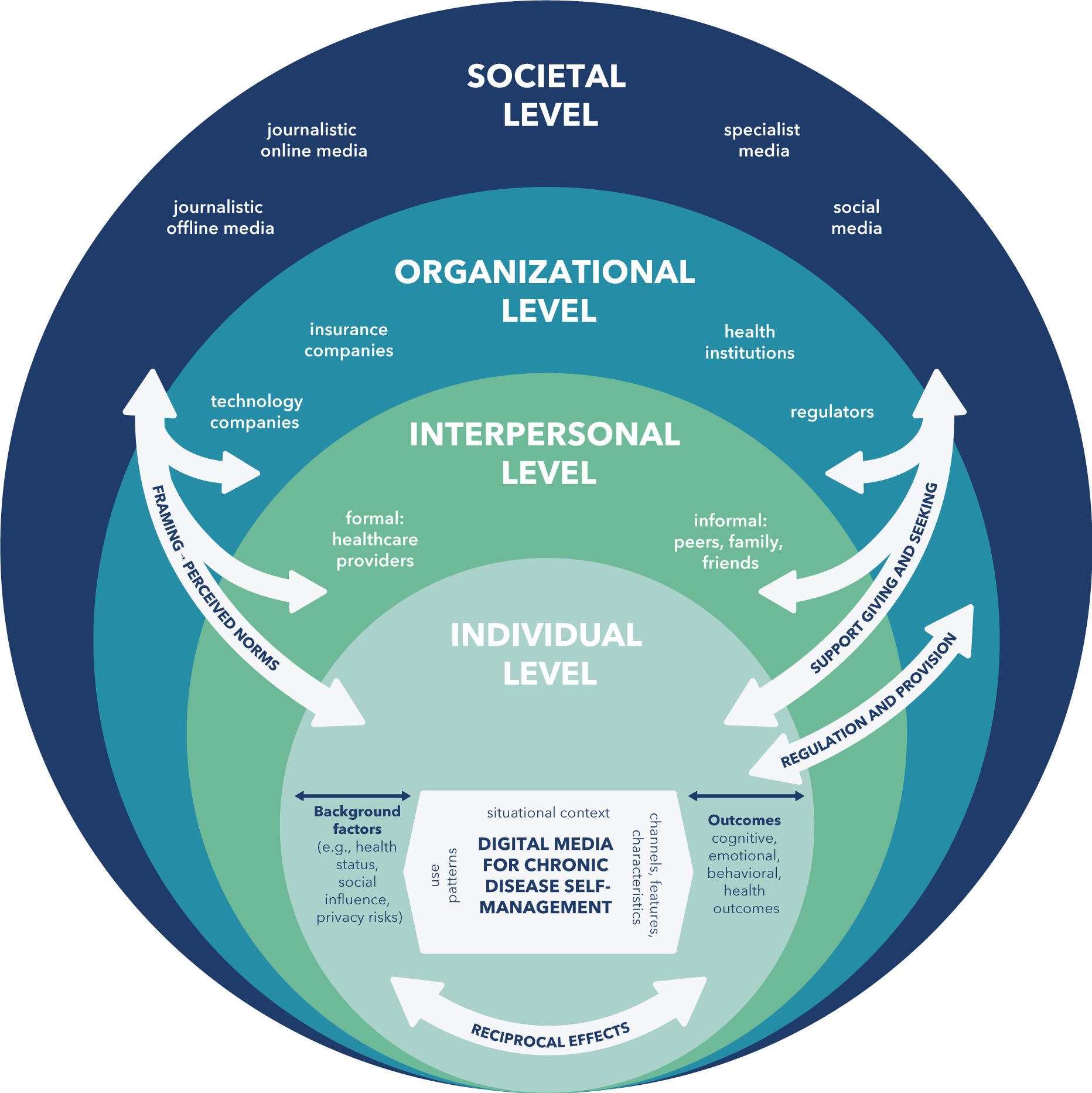ABOUT THE PROJECT
Digital Media in Chronic Disease Self-Management
Chronic diseases are among the most common and economically significant health problems in industrialized countries. Considering the high number of people living with chronic diseases that cause long-term strains on both individuals and society, effective treatment measures are necessary to facilitate long-term coping with such diseases. Given their ubiquitous and interactive character, digital media technologies, such as mobile and online applications, are predestined to facilitate self-management. Indeed, evidence on the effects of using digital media for chronic disease self-management is promising overall. However, the results are inconsistent and have limited validity due to theoretical and methodological weaknesses. Furthermore, processes beyond the individual level, that is, the processes within and between the interpersonal, organizational, and societal (and the individual) levels, have been widely neglected thus far. These processes have to be considered to grasp the full picture of the role digital media play in the self-management of chronic diseases, especially since the use of digital technologies for self-management is not without criticism.
NEED FOR A MULTI-LEVEL PERSPECTIVE
Ecological Model of Digital Chronic Disease Self-Management
Given the problem background, the research unit DISELMA examines the continued use and effects of digital chronic disease self-management in its interpersonal, organizational, and societal contexts and the pertaining phenomena on each level. With this, DISELMA aims to contribute to improving the theoretical and empirical multi-level understanding of digital chronic disease self-management at each level and between levels, gives answers to a highly dynamic and controversial field, and provides insights relevant to questions beyond disease self-management, such as digital media, for coping with stressors and multi-level analysis of diverse communication phenomena.
Our Ecological Model of Digital Chronic Disease Self-Management illustrates interrelations between individual digital media use and its indirect as well as its direct context influences at various levels. We will take these different levels into account in six individual projects.
This comprehensive perspective not only allows an integration of the different levels but also considers cross-level interactions between them.
Individual Projects
Situated on the individual level, the individual project: Use (principal investigator Prof. Dr. Veronika Karnowski and research associates Janine Brill and Dr. Annemarie Wiedicke) aims to map the specific niches of mobile media use in chronic disease self-management for diabetes type 1 and 2 and asthma/COPD. To this end, this project will (1) systematize extant empirical evidence on the uses of mHealth in the self-management of these chronic conditions, explicitly considering the role of the entire mobile media ecosystem, (2) map types of mobile media use for the self-management of diabetes and asthma/COPD on the situation and person level and based on these findings, (3) reevaluate and enhance the niche concept, (4) investigate how persons living with diabetes and asthma/COPD contextualize our findings, considering their experiences.
Expected results/contributions: The results of this project will guide further studies on the usefulness and implementation of mHealth interventions in chronic disease self-management, as well as, ultimately, the development of adequate mHealth products to support self-management for diabetes and asthma/COPD patients. In addition, this project will provide insights into the empirical applicability of the niche concept to study mobile media use practices in general and in the context of mHealth.
Situated on the individual level, the individual project: Effects (principal investigator Prof. Dr. Constanze Rossmann and research associates Alexandra Lux and Nariman Sawalha) aims to (1) systemize the spectrum of mHealth channels, features, and characteristics and extend systemizations of app characteristics to the entire mobile media ecosystem, (2) identify patterns of continued use integrating determinants of use, privacy perceptions, and social influences, and (3) analyze the process of effects of mobile chronic diseases management on cognitive, behavioral, and health outcomes considering reciprocal effects and perceived social influences.
Expected results/contributions: The results will improve systemizations of app characteristics and contribute to the overarching question of using digital media for the self-management of chronic diseases by theoretically and empirically specifying the long-term process of the use of mobile media for chronic disease management on the individual level under consideration of social influences. Ultimately, this will advance the broader scope of coping with personal challenges by applying a multi-level perspective and integrating both problem-focused and emotion-focused coping, and will also provide practical insights for app developers and healthcare.
Situated on the interpersonal level, the individual project: Healthcare (principal investigator PD Dr. Claudia Riesmeyer and research associate Rebecca Kammerer) aims to (1) theoretically conceptualize the physician-patient relationship by adapting the actor-structure-dynamics, (2) gain a holistic, systematic, and reciprocal view of the physician-patient relationship, and (3) investigate all facets of the physician-patient relationship as actor-structure-dynamics, capturing physicians’ and patients’ self- and mutual perceptions.
Expected results/contributions: The theoretical modeling of the physician-patient relationship will be adapted based on the empirical results. With its multi-methodological design, the project expands the state of research by casting a process perspective on the physician-patient relationship, focusing on the negotiation and mediation process of digital media use for chronic disease self-management in its entirety.
Situated on the interpersonal level, the individual project: Peers (principal investigator Prof. Dr. Doreen Reifegerste and research associate Anna-Lena Esser) aims to (1) systemize the structure of informal networks for everyday life integration of digital media in chronic disease self-management by identifying relevant contacts, (2) analyze the evaluations and addressed factors within the content of the metacommunication, and (3) study the perceived effects of metacommunication on the usage of health-related digital media and health outcomes, integrating influences from interpersonal, organizational, and societal levels.
Expected results/contributions: The results will allow us to better integrate the interpersonal determinants in the theories of adoption and integration and contribute methodically to the empirical inquiry of metacommunication for digital coping with chronic diseases by combining ego-centered network analysis with user surveys and interviews. Finally, the identification of relevant strategies concerning private influence provides more holistic and, thus, sustainable intervention strategies for the self-management of chronic diseases.
Situated on the organizational level, the individual project: Organizations (principal investigator Prof. Dr. Juliana Raupp and research associate Elisabeth Gerling), aims to (1) shed light on the organizational context of individual use of digital media for chronic disease self-management, (2) identify organizational communication strategies, (3) discover prevailing frames in organizational communication for chronic disease self-management, and (4) analyze the relationship between organizational type, communication strategy, and frames. For the research unit, the project seeks to provide a link between projects at the micro and macro levels.
Expected results/contributions: The project contributes to health communication research by focusing on the organizational level, which has received little attention to date, and in particular on organization-specific communication strategies about digital self-management. It advances research on strategic organizational communication both theoretically and empirically by analyzing and reflecting on a relevant and hitherto little-studied area of digital communication.
Situated on the societal level, the individual project: Reporting, (principal investigator Prof. Dr. Julia Metag and research associate Franca Singh), aims to contribute to a theoretical and empirical understanding of patterns of reporting on digital media for coping with stressors. It does so (1) by analyzing the share of reporting on digital media use for the self-management of chronic diseases within the entire coverage of chronic diseases and (2) by analyzing reporting on digital media for the self-management of chronic diseases with regard to topics, frames, and news factors and the construction of scientific evidence.
Expected results/contributions: The results will reveal patterns of reporting on digital media use for self-management of chronic conditions and contribute to the overarching question of digital coping with chronic conditions from a societal and macro-perspective. The project will provide information for journalists on possibilities to deal with scientific evidence with regard to digital media use.
COLLABORATIONS WITHIN THE RESEARCH UNIT
SHARED KEY CONCEPTS
All six individual projects are linked by shared key concepts that are fundamental to our common understanding of the role of digital media in chronic disease self-management. In addition to the overarching key concept Self-Management, the individual projects work together in four concept groups that facilitate exchange among these projects and foster theory development, as well as development and joint application of measurements, and joint data analysis.
All individual projects are united by a common understanding of and the goal of contributing to a better understanding of self-management of chronic diseases by reworking it in their projects, providing a multi-perspective interrogation of self-management through digital media.
A prerequisite for the effective implementation of digital media in chronic disease self-management is that individuals not only adopt a certain technology for a short time, but also integrate the use of digital media for chronic disease self-management into their everyday lives. Therefore, this concept group will focus on the drivers and patterns of the continued use of digital media ecosystems. This common understanding is especially prevalent in the individual projects: Use (Prof. Dr. Veronika Karnowski), Effects (Prof. Dr. Constanze Rossmann), Healthcare (PD Dr. Claudia Riesmeyer), and Peers (Prof. Dr. Doreen Reifegerste).
Numerous theories have evolved in social and health psychology, as well as communication research, to explain individual behavior. Several of these theories are relevant in explaining adoption or continued use decisions (e.g., technology acceptance model, the extended unified theory of acceptance and use of technology (UTAUT2) or self-management behavior (e.g., theory of planned behavior, common sense model of self-regulation). The common meaning ground of all of these models and theories is that decisions are based on an individual assessment of expectations (e.g., expectations about the utility of digital media for chronic disease self-management) and their value (e.g., the importance of utility) in making behavioral decisions, such as adoption, continued use, privacy decisions, and behavioral intentions. This understanding is especially relevant to the individual projects: Use (Prof. Dr. Veronika Karnowski), Effects (Prof. Dr. Constanze Rossmann), Healthcare (PD Dr. Claudia Riesmeyer), and Peers (Prof. Dr. Doreen Reifegerste) to explain determinants of use, as well as the individual action and interaction with others and metacommunication about the determinants of use and effects.
Previous research indicates that the role of digital media in chronic disease self-management cannot be fully assessed by considering only individuals living with a chronic disease. In contrast, the individual is embedded in a network of healthcare providers, family, friends, peers, and organizations that may differently influence the use and effects of digital media for chronic disease self-management, which is evidenced by recommendations to use specific apps, the provision of apps to individuals and healthcare providers, and seeking and giving social support in interpersonal contacts or via social media. Network approaches are especially relevant in the individual projects: Healthcare (PD Dr. Claudia Riesmeyer), Peers (Prof. Dr. Doreen Reifegerste), Organizations (Prof. Dr. Juliana Raupp), and Reporting (Prof. Dr. Julia Metag), which consequently collaborate within this concept group.
Beyond personal and organizational networks, public and organizational discourses in journalistic and social media and organizational outlets may affect how individuals deal with digital media in managing their diseases as well. The pertaining individual projects: Organizations (Prof. Dr. Juliana Raupp) and Reporting (Prof. Dr. Julia Metag) in this concept group draw on the framing approach to identify and describe these discourses.
Joint Objectives of the Research Unit
The following joint objectives emerge from the background and the ecological model of digital chronic disease self-management:
Use and Effects
To gain a clear understanding of the (continued) use patterns of digital media resulting from determinants of use and situational influences, as well as the effects of continued use of digital media for chronic disease self-management.
Influences of Networks
To gain insight into the influences of interpersonal and organizational networks on digital chronic disease self-management imposed by formal and informal support and organizational structures.
Discourse and Framing
To understand the public discourse and framing of digital chronic disease self-management in journalistic online and offline media, specialist media, and social media.
Interactions
To gain a conclusive picture of the interrelations of individual, interpersonal, organizational, and societal influences on digital media in chronic disease self-management.
Extension
To extend the ecological model of digital chronic disease self-management by theoretically and empirically specifying cross-level relationships as a basis for testing causal relationships.
Transfer
To draw conclusions from this phenomenon for the broader context of digital media in problem and emotion-focused coping with personal stressors in modern societies.






